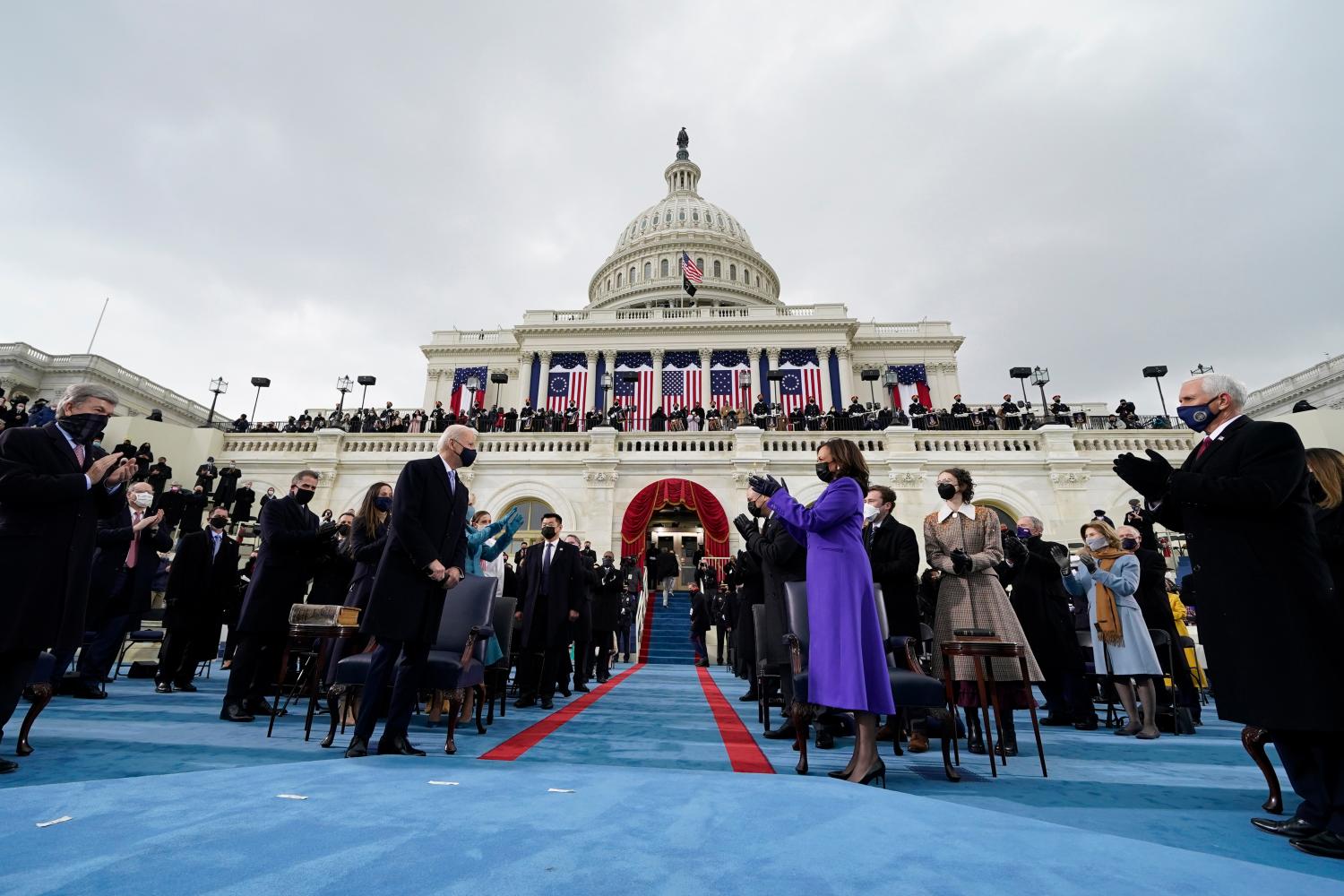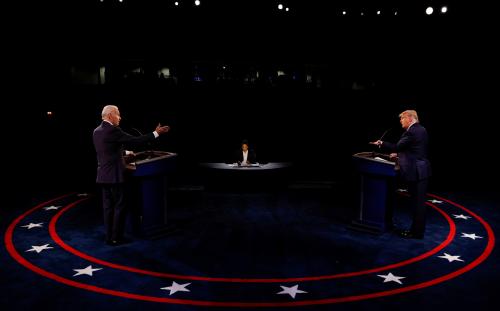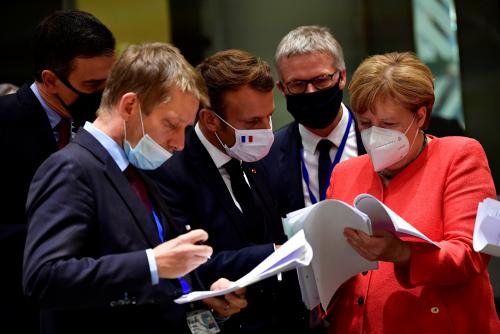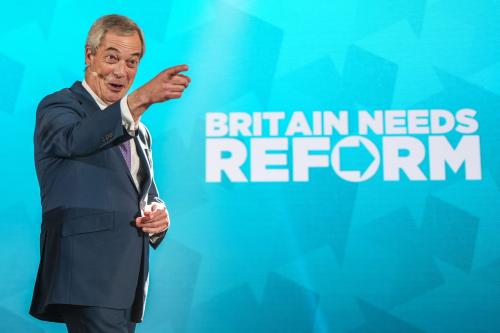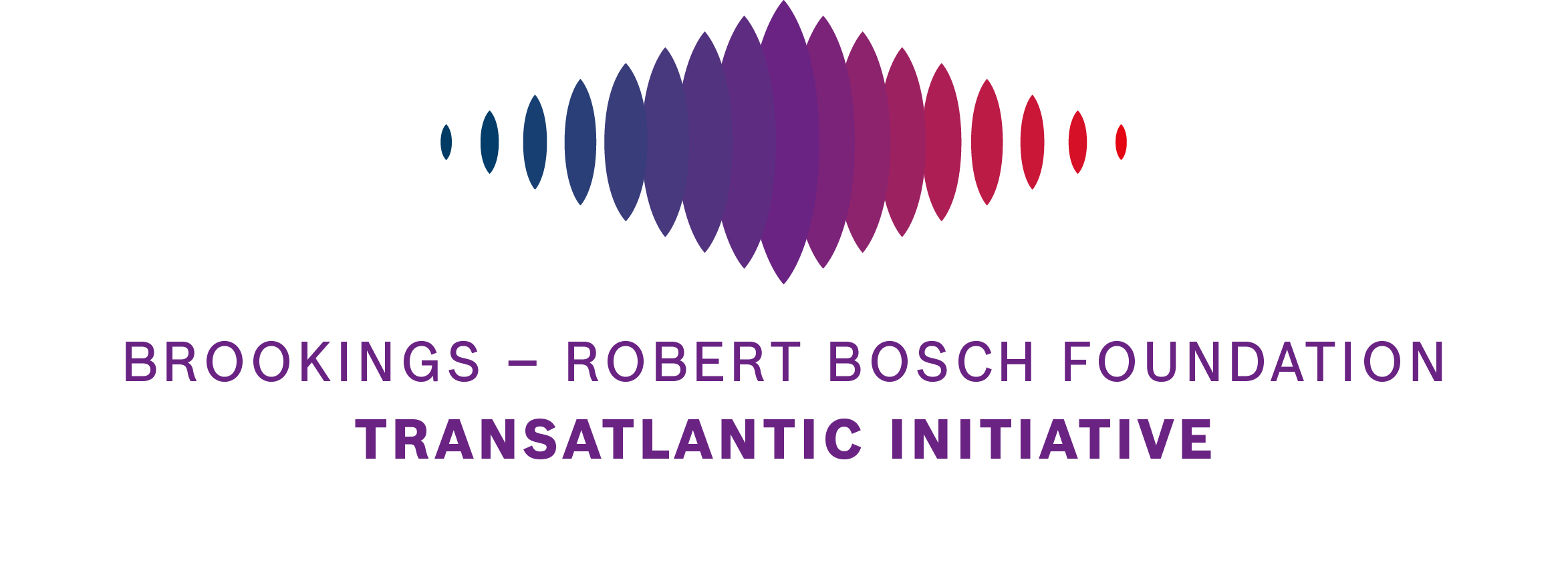 Welcome to the tenth edition of the Trans-Atlantic Scorecard, a quarterly evaluation of U.S.-European relations produced by Brookings’s Center on the United States and Europe (CUSE), as part of the Brookings – Robert Bosch Foundation Transatlantic Initiative. To produce the Scorecard, we poll Brookings scholars and other experts on the present state of U.S. relations with Europe — overall and in the political, security, and economic dimensions — as well as on the state of U.S. relations with five key countries and the European Union itself. We also ask about several major issues in the news. The poll for this edition of the survey was conducted January 11 to 14, 2021. The experts’ analyses are complemented by a timeline of significant moments over the previous three calendar months and a snapshot of the relationship, including a tracker of now former President Trump’s telephone conversations with European leaders, figures presenting data relevant to the relationship, and CUSE Director Thomas Wright’s take on what to watch in the coming months.
Welcome to the tenth edition of the Trans-Atlantic Scorecard, a quarterly evaluation of U.S.-European relations produced by Brookings’s Center on the United States and Europe (CUSE), as part of the Brookings – Robert Bosch Foundation Transatlantic Initiative. To produce the Scorecard, we poll Brookings scholars and other experts on the present state of U.S. relations with Europe — overall and in the political, security, and economic dimensions — as well as on the state of U.S. relations with five key countries and the European Union itself. We also ask about several major issues in the news. The poll for this edition of the survey was conducted January 11 to 14, 2021. The experts’ analyses are complemented by a timeline of significant moments over the previous three calendar months and a snapshot of the relationship, including a tracker of now former President Trump’s telephone conversations with European leaders, figures presenting data relevant to the relationship, and CUSE Director Thomas Wright’s take on what to watch in the coming months.
October
- October 1
- The European Council agreed to impose sanctions on 40 Belarusian officials including Interior Minister Yuri Karayev and former Prosecutor General Alexander Kanyuk, but not Belarusian President Alexander Lukashenko, over the country’s fraudulent presidential election. In response, the Belarusian government revoked the accreditation of foreign journalists, recalled its ambassadors from Lithuania and Poland, and requested that Lithuania and Poland reduce their diplomatic presence in Minsk.
- October 2
- U.S. President Donald Trump announced that he and First Lady Melania Trump had tested positive for COVID-19 and would go into isolation.
- October 6
- The Organization for the Prohibition of Chemical Weapons confirmed that the substance used to poison Russian opposition leader Alexei Navalny had “similar structural characteristics” to the Novichok family of highly potent nerve agents. The next day, France and Germany accused Russia of poisoning Navalny, saying in a joint statement that no other plausible explanation existed.
- October 6
- Manfred Weber, Iratxe García Pérez, Dacian Cioloș, Ska Keller, and Philippe Lamberts, the presidents of the European People’s Party, S&D Group, Renew Europe, and the Greens/European Free Alliance respectively, wrote that European values were “not for sale” and urged greater action to protect the rule of law in negotiations over the EU budget.
- October 6
- The European Court of Justice (ECJ) ruled that Hungary’s 2017 education reform, which imposed restrictions on foreign universities, violated both EU law and Hungary’s commitments as a World Trade Organization (WTO) member. The reform both required foreign universities based in Hungary to offer classes in their home countries and for a bilateral agreement to exist between a foreign university’s home country and Hungary – changes viewed as targeting the Central European University.
- October 7
- After a five-year trial, a Greek court ruled that the leaders of the far-right Golden Dawn party were guilty of operating as a criminal organization.
- October 12
- EU foreign ministers agreed to impose new sanctions on 6 Russians individuals and 1 entity deemed responsible for the poisoning of Alexei Navalny.
- October 12
- The European Council agreed to sanction Belarusian President Alexander Lukashenko. The same day, the Belarusian government threatened use of lethal weapons on pro-democracy protesters.
- October 13
- Poland threatened to veto the European Union’s €1.8 trillion budget and coronavirus recovery plan if it contained rule of law conditions. Jarosław Kaczyński, leader of the ruling Law and Justice party (PiS), likened the rule of law measures to “threats and blackmail” and said that Poland would defend its interests.
- October 14
- The WTO authorized the European Union to impose tariffs on $4 billion in U.S. goods. The tariffs were allowed as retaliation against illegal subsidies provided to U.S. airplane manufacturer Boeing. As part of the years-long dispute, the United States imposed tariffs on the European Union last year after winning a WTO challenge over subsidies provided to Boeing’s European rival Airbus.
- October 16
- A French middle school teacher Samuel Paty was murdered following threats he received for showing caricatures of the Prophet Muhammad during a class on freedom of expression. French President Emmanuel Macron said after the murder that it bore the hallmarks of an “Islamist terrorist” attack.
- October 19
- The right-wing nationalist Ersin Tatar won the presidential election in the self-declared Turkish Republic of Northern Cyprus. Mr. Tatar is pro-Turkey and opposes the reunification of the northern part of the island with the southern, majority-Greek Republic of Cyprus, an EU member state.
- October 20
- The European Commission launched infringement procedures against Cyprus and Malta for each country’s investor citizenship scheme — referred to as a “golden passport,” alleging that granting citizenship based on pre-determined investments violated European values. While Cyprus and Malta offered the most notorious examples of such schemes, 18 other EU member states operate similar residency-by-investment programs.
- October 20
- North Atlantic Treaty Organization (NATO) Secretary-General Jens Stoltenberg announced plans to set up a new space command center in Germany aimed at countering threats to satellite infrastructure in orbit. The decision emphasized NATO’s increased focus on extraterrestrial threats.
- October 22
- The European Union, along with the United Kingdom, sanctioned two Russian intelligence officers and GRU Unit 26165, also known as “Fancy Bear” or Advanced Persistent Threat 28, for the 2015 hack of the German parliament. The hack targeted the Bundestag’s information system and the hackers successfully stole information and accessed the email accounts of Chancellor Angela Merkel and other members of parliament.
- October 22
- The Polish constitutional court ruled that abortions due to fetal defects were unconstitutional, removing one of the more common legal grounds for abortion in the country and making abortion permissible only in cases of rape, incest, or a threat to the mother’s life.
- October 23
- The Belarusian opposition won the European Parliament’s 2020 Sakharov Prize for Freedom of Thought. European Parliament President David Sassoli said the Belarusian opposition for standing up to a “much stronger adversary” and said, “we are by your side.”
- October 23
- In a joint phone call, U.S. Secretary of State Mike Pompeo and EU High Representative Josep Borrell launched the new U.S.-EU Joint Dialogue on China. The next high-level meeting was scheduled for mid-November 2020.
- October 25
- Armenia and Azerbaijan agreed to a new U.S.-brokered “humanitarian ceasefire” in the disputed region of Nagorno-Karabakh. This was the third attempt at a ceasefire, as previous truces agreed on October 10 and 17 had each fallen apart after only a day. The U.S.-brokered ceasefire would also collapse the next day, with each side accusing the other of violating the agreement.
- October 26
- Thousands of protestors gathered in towns and cities across Poland in the wake of the Constitutional Church of Poland’s decision to further restrict abortion. One church in Warsaw even saw clashes between pro-choice demonstrators and far-right activists.
- October 28
- France and Germany announced new coronavirus restrictions to combat a second wave of infections. Starting on October 30, French restaurants and bars would close, but schools, public services, and some factories would remain open. Chancellor Merkel and Germany’s 16 state premiers agreed to close bars, restaurants, gyms, pools and other non-essential businesses for the month of November.
- October 29
- A knife attack at a church in the French city of Nice killed three people and injured several others. The suspected killer, a Tunisian man, was arrested after lunging at French police officers with a knife. The attack came just two weeks after Paty’s beheading in Conflans-Sainte-Honorine.
November
- November 2
- A terrorist attack in Vienna killed four people and wounded many more in a series of shootings. One gunman was killed by the police. The following morning, Interior Minister Karl Nehammer said that Austria had “experienced an attack from at least one Islamist terrorist.”
- November 3
- The United Kingdom imposed new lockdown measures in response to increasing cases. Bars, restaurants, and nonessential stores were closed, and people were only allowed to leave their homes for essential purposes. The measures would last at least a month.
- November 3
- Americans went to the polls for the 2020 U.S. presidential election. With millions of Americans voting early or by mail due to the pandemic, the election remained undecided until November 7, when Joe Biden was declared victor. Despite votes still being counted, President Trump declared victory in a press conference in the early morning hours of November 4 and claimed that Democrats were trying to “steal” the election.
- November 5
- Despite the election results having not been called, Slovenian Prime Minister Janez Janša congratulated Trump for winning the election. The prime minister tweeted: “It’s pretty clear that American people have elected Donald Trump and Mike Pence for four more years. More delays and facts denying from #MSM, bigger the final triumph for #POTUS. Congratulations @GOP for strong results across the #US @idualliance.”
- November 5
- The European Council and the European Parliament reached a preliminary agreement on a measure to link the rule of law to the disbursement of EU funds as part of the EU’s budget for 2021-2027 and coronavirus recovery plan. Still needing to be approved by the EU’s national parliaments, the measure faced an uphill battle as the effort was construed as an “ideological blackmail tool” by Hungary and Poland, in the words of Hungarian Justice Minister Judit Varga.
- November 5
- Officials from Austria and France announced plans to push for tougher EU-wide measures to prevent Islamist extremism on the continent. The announcement came after recent terrorist attacks in both countries.
- November 9
- The European Union placed additional tariffs of 15% on U.S. aircraft and 25% on U.S. agricultural goods. The move was the latest in the ongoing dispute between the European Union and the United States over government subsidies paid to Airbus and Boeing, respectively. The WTO had authorized the tariffs at the end of October 2020.
- November 9
- Armenia, Azerbaijan, and Russia announced that they struck a deal to end the conflict over Nagorno-Karabakh, and that 1,960 Russian peacekeepers would be deployed along the line of contact. Turkey secured a transport corridor running from eastern Turkey to the Caspian Sea via the Azerbaijani exclave of Nakhichevan, effectively creating a new trade route to Central Asia.
- November 10
- Joe Biden spoke with President Macron of France, Chancellor Merkel of Germany, Prime Minister Johnson of Britain, and Prime Minister Micheál Martin of Ireland. According to Biden’s transition team, the president-elect communicated to Macron that he was interested in “reinvigorating bilateral and trans-Atlantic ties, including through NATO and the EU.”
- November 10
- The European Commission charged Amazon with misusing data from third-party merchants to benefit its own products and thereby violating EU antitrust rules. The European Commission also opened a second investigation into Amazon’s potential preferential treatment of its own products over those of other merchants that also use Amazon logistics and delivery services.
- November 11
- The European Commission adopted a deal with BioNTech and Pfizer to purchase up to 300 million doses of their COVID-19 vaccine. The move came two days after the companies announced that their vaccine was over 90% effective. This deal was the fourth vaccine deal negotiated by the European Commission after EU member states voted to authorize the Commission to negotiate on their behalf in June 2020.
- November 13
- Dominic Cummings, chief adviser to British Prime Minister Johnson, quit abruptly. Cummings was the chief architect and driver of Brexit in the administration and a key ally in Boris Johnson’s campaign to become prime minister.
- November 16
- Poland and Hungary blocked a key step to establishing the EU’s €750 billion coronavirus recovery fund over their opposition to linking EU funds to respect for the rule of law.
- November 19
- German Foreign Minister Heiko Maas urged Turkey to refrain from further incursions into the Eastern Mediterranean, threatening EU sanctions in the following month if Ankara did not stop what the European Council’s October conclusions referred to as “illegal activities vis-à-vis Greece and Cyprus,” such as sending vessels for gas exploration into those countries’ waters.
- November 19
- British Prime Minister Johnson announced a £16.5 billion increase in defense spending. He pledged to end the U.K.’s “era of retreat,” with an increase of £4 billion per year for the next four years.
- November 23
- U.S. President-elect Joe Biden announced long-time advisor Antony Blinken as his nominee for secretary of state.
- November 24
- The European Commission requested that EU countries improve their efforts to integrate migrants into European society. It issued a new set of guidelines and goals for integration in education, employment, health, and housing.
- November 25
- The Reflection Group appointed by NATO Secretary General Stoltenberg released a report urging changes within the alliance to better address threats from Russia and China, including devoting “much more time” and “political resources” to security challenges posed by China.
- November 28
- Over 46,000 people gathered in Paris to protest new security legislation, which would restrict the sharing of images featuring police officers’ faces and toughen government surveillance capability. The controversy was intensified by the beating and racial abuse of Black music producer Michael Zecler that surfaced on November 26 and in connection to which four police officers were charged.
- November 30
- The United Kingdom released its plan to phase out existing subsidies to farmers in England once the Brexit transition period ends. A new scheme will be created whereby support for landowners is contingent on the environmentally friendly use of land. It will replace the current “basic payments scheme” under EU Common Agricultural Policy.
- November 30
- German Chancellor Angela Merkel considered concessions to Hungary and Poland, which are blocking the EU’s €1.8 trillion budget-and-recovery package over the rule of law provision. She said that both sides must agree to compromises in order to move forward with the deal.
December
- December 2
- The United Kingdom became the first country to approve the COVID-19 vaccine developed by Pfizer and BioNTech, granting emergency authorization. In advance of the end of its transition period with the European Union on December 31, 2020, the United Kingdom did not use the EU’s regulatory body to approve the vaccine.
- December 2
- The European Commission released “A new EU-US Agenda for global change,” its proposal to revitalize the European Union’s relationship with the United States. The reset includes measures on digital regulations and coronavirus vaccines as a response to the “strategic challenge” posed by China.
- December 3
- EU Commission President von der Leyen told European Parliament President Sassoli that the Commission would move forward with the EU’s proposed €750 billion recovery fund without Hungary and Poland if the dispute over the rule of law provision was not settled within the following week.
- December 5
- British Prime Minister Johnson and EU Commission President von der Leyen spoke on the phone after another day of Brexit negotiations. In a joint public statement, they said an agreement was not feasible without resolving disagreements on three primary issues of governance: fishing rights in U.K. waters, fair competition, and ways to solve future disputes.
- December 7
- The European Council agreed to create a global human rights sanctions regime, that would allow for the targeting of individuals, entities, and other bodies responsible for or associated with human rights violations. Initially proposed by the European Commission on October 19, 2020, the new sanctions framework replaced the piecemeal, country-by-country approach that had previously existed for human rights violations.
- December 8
- The United Kingdom administered its first COVID-19 vaccine dose, becoming the first country in the world to provide a clinically-authorized and tested vaccine against COVID-19.
- December 10
- The French government revealed a new law intended to tackle Islamist extremism, originally titled the “anti-separatism” bill. In response to criticism that the bill discriminated against Muslims on the grounds of religion, Prime Minister Jean Castex said the text does not target religious freedom but is aimed at “the nefarious ideology of radical Islamism.”
- December 10
- European leaders reached an agreement on the $2.2 trillion recovery fund, which was blocked for months by Poland and Hungary due to a battle over the inclusion of a rule of law provision. The fund marks the first time the European Union agreed to issue joint debt.
- December 11
- EU member states agreed to a new climate change target: cut net greenhouse gas emissions by at least 55% from 1990 levels by 2030, replacing the previous goal to cut emissions by 40% by 2030.
- December 14
- Bellingcat, The Insider, CNN, and Der Spiegel released a joint investigation into Russia’s Federal Security Service’s (FSB) involvement in the August 2020 poisoning of opposition leader Alexei Navalny. Studying telecom and travel data, the team concluded that in 2017, 2019, and 2020, FSB operatives shadowed Navalny during his more than 30 trips across Russia.
- December 15
- The Netherlands entered a five-week coronavirus lockdown in advance of the holiday season. People were encouraged to stay home as much as possible. No more than two visitors were allowed per day, with the exception of Christmas, when a maximum of three guests were allowed.
- December 15
- The European Commission released two proposals intended to reform the digital space: the Digital Services Act and Digital Markets Act. Both proposals seek to ensure that users have access to safe online services and products and that European businesses can fairly and freely compete online.
- December 16
- The European Parliament adopted the €1.074 trillion Multiannual Financial Framework, which outlines EU funding from 2021-2027. The European Parliament also approved the “rule of law” conditionality for access to EU funds.
- December 16
- Frans Timmermans, the executive vice president of the European Commission, launched the European Climate Pact, an initiative aimed at increasing climate action participation.
- December 16
- A French court convicted 14 people of crimes ranging from financing terrorism to gang membership in relation to the Islamist attacks in 2015 against the Charlie Hebdo magazine and a Jewish supermarket.
- December 17
- Commission President von der Leyen announced that EU countries would begin administering COVID-19 vaccines between December 27 and 29.
- December 17
- French President Macron tested positive for COVID-19 and went into self-isolation for seven days while continuing to work remotely.
- December 20
- Amid growing concerns about the new, highly-infectious COVID-19 variant first detected in the U.K., numerous countries, including Canada, France, Germany, India, Italy, and Russia, announced restrictions on travelers leaving the United Kingdom.
- December 21
- The European Commission approved the BioNTech-Pfizer coronavirus vaccine for people over the age of 16.
- December 22
- In response to October 2020 EU sanctions enacted over the poisoning of opposition leader Alexei Navalny, the Russian Ministry of Foreign Affairs announced it would impose entry bans on representatives of EU member states and institutions.
- December 24
- The European Union and United Kingdom reached an agreement on the terms of their future cooperation. The draft Trade and Cooperation Agreement includes three main pillars: a Free Trade Agreement, a new partnership for citizen security, and a horizontal agreement on governance.
- December 27
- EU member states officially began the administration of the COVID-19 vaccine.
- December 27
- Belarussian activists carried out their final peaceful demonstration of the year over the country’s fraudulent election. Since August, while President Alexander Lukashenko remained in power and opposition candidate Sviatlana Tsikhanouskaya remained in exile, activists took to the streets, often resulting in the detention of hundreds of peaceful protesters.
- December 28
- EU ambassadors unanimously approved a provisional application of the EU-U.K. Trade and Cooperation Agreement deal to go into effect on January 1, 2021. European Commission President von der Leyen, European Council President Charles Michel, and Prime Minister Johnson all signed the agreement individually the next day.
- December 28
- Russia’s Federal Prison Service (FSIN) accused opposition leader Alexei Navalny of violating the terms of a 2014 suspended prison sentence and alerted Navalny that he was required to return to Russia by December 29, 2020 or that he would be arrested upon his return.
- December 29
- The EU announced it would purchase an additional 100 million doses of the Pfizer/BioNTech vaccine, bringing the total number of vaccine purchases to 300 million doses, which would be split between EU member states and neighboring countries proportionally based on population.
- December 30
- After seven years of discussion, The European Union and China concluded negotiations on a Comprehensive Agreement on Investment (CAI). The agreement provided greater market access for EU investors in China and bound the parties into an investment relationship grounded on sustainable development principles. The CAI then faced deliberations for adoption and ratification.
Snapshot
Europe on the line
Between October 1 and December 31, 2020, President Trump spoke on the phone with French President Macron three times (October 1, October 29, December 17) and with British Prime Minister Boris Johnson once (October 7).
 We tracked former President Trump’s phone calls with the leaders of France, Germany, Russia, Turkey, and the United Kingdom, whether they had spoken or not, as well as other calls with European leaders of which we were aware. The Trump White House stopped releasing readouts of the president’s calls with foreign leaders in July 2018. If we missed a conversation, please give us a ring. Sources: Press reports.
We tracked former President Trump’s phone calls with the leaders of France, Germany, Russia, Turkey, and the United Kingdom, whether they had spoken or not, as well as other calls with European leaders of which we were aware. The Trump White House stopped releasing readouts of the president’s calls with foreign leaders in July 2018. If we missed a conversation, please give us a ring. Sources: Press reports.
Figures
Far-right extremism has recently emerged as a significant threat to the internal constitutional orders of both the United States and key European partners like Germany. In the United States, the danger posed by a large, armed, far-right scene crystallized on January 6, when a mob stormed the U.S. Capitol to protest the outcome of the November 3, 2020 election.
In August 2020, on the back of a large protest in Berlin against social distancing, hundreds of neo-Nazis and other far-right extremists broke through a police line and unsuccessfully attempted to break into the Bundestag (German Parliament). In November 2020, aided by elected members of the far-right Alternative für Deutschland (Alternative for Germany, or AfD), extremists and QAnon supporters entered the Bundestag and attempted to disrupt a vote on Germany’s infection protection law.
Quantitative comparisons of far-right extremism in the United States and Germany need to be undertaken with great caution, given very different legal, historical, and cultural contexts. For example, German criminal law — for obvious historical reasons — permits prosecution of certain forms of political speech as hate speech; in the United States, with its more than 200-year tradition of robust protection of political speech, calls for crackdowns on hate speech are far more fraught. Germany’s domestic federal intelligence service, the Bundesverfassungsschutz (Federal Office for the Protection of the Constitution, or BfV), tracks both far-right and far-left extremists, placing individuals and entities under observation when they are deemed hostile to Germany’s free democratic constitutional order. But both the U.S. and Germany track crimes committed against minorities. The American FBI reports annual numbers of hate crimes, while the BfV records the annual number of xenophobic or anti-Semitic violent crimes committed by the far right.
In the United States, with the exception of the year 2001, which saw a large spike, the number of hate crimes committed annually gradually decreased gradually by 37.4% overall between 1996 and 2014 — from 8,759 per year to 5,479. Beginning in 2015, the year before Donald Trump was elected president, hate crimes began to increase again, rising to 7,314 in 2019. A significant jump of 17.2% subsequently occurred between 2016 and 2017, the largest single year increase since 2000-2001, when hate crimes increased by 20.7%. Rates have since settled, but at a higher level than that observed in the early 2010s.
Between 1996 and 2010, xenophobic and anti-Semitic violent crimes committed by far-right extremists in Germany were roughly stable, then dropped slightly. Following a slow increase beginning in 2011, violent xenophobic and anti-Semitic crimes spiked in 2015 and 2016, coinciding with the 2015 migration crisis — when more than one million migrants and refugees came to Germany, mostly from Syria. Indeed, violent xenophobic and anti-Semitic crimes in Germany jumped from 543 per year in 2014 to 947 in 2015 and then 1,221 in 2016, a 124.9% increase in two years. Between 2016 and 2019, the number of crimes committed per year decreased by 38.5% but settled at a far higher rate than that observed prior to 2015.
Based on the overall numbers of hate crimes and xenophobic and anti-Semitic crimes committed, parallel trajectories can be broadly detected in the United States and Germany from the late 1990s to the early 2010s. In both countries, the number of violent crimes targeting foreigners or minorities gradually decreased over this period (in Germany until 2010, in the United States until 2014). Both countries then witnessed an increase in violence throughout the 2010s. In Germany, the number of xenophobic or anti-Semitic violent crimes rose by 139.2% between 2010 and 2019. In the United States, the number of hate crimes committed per year saw a 33.5% increase between 2014 and 2019. Although the trend is more dramatic in Germany, both countries have reversed previously decreasing trends in rates of crimes against foreigners and minorities in recent years.
In both Germany and the United States, racism, anti-Semitism, and white supremacy have old roots. But a significant driver for the increase in violence in Germany was the 2015 migration crisis, which intensified deep-rooted tensions surrounding immigration and identity and led to a surge in support for the far-right party AfD, which became the opposition leader in Bundestag following the 2017 election. In the United States, the rise in targeted violence has been linked to a combination of polarized domestic politics and a surge in white supremacist groups. But the 2016 presidential campaign and Trump’s first year in office coincided with the largest year-to-year increase in hate crimes in the post 9/11 period.
What to Watch
Center on the United States and Europe Director Thomas Wright lays out events, issues, and potential developments to watch for in the months ahead.
I am delighted to share with you the tenth edition of the Trans-Atlantic Scorecard, a quarterly evaluation of U.S.-European relations produced by Brookings’s Center on the United States and Europe, as part of the Brookings – Robert Bosch Foundation Transatlantic Initiative.
For the past few years, the scorecard results have been relatively static at a low base — a reflection of the troubles that afflicted the alliance during the Trump administration. The advent of the Biden administration brings hope of a significant improvement although it is still too early to tell how the alliance will tackle some of the daunting challenges it faces, including defeating COVID-19. Despite recent advancements in vaccine production and distribution on both sides of the Atlantic, the future trajectory of the pandemic remains uncertain given new, more transmissible variants of COVID-19 spreading across the United States and Europe. Delays in vaccine production and distribution also threaten to reverse what success the European Union has had in managing the COVID-19 crisis. On both sides of the Atlantic, the past four years have exposed significant democratic decline. Illiberal populism presents a threat to the democratic foundations of the trans-Atlantic relationship that will likely outlive the tenure of current leaders in both the United States and Europe.
A few points from this iteration of the survey are worth highlighting.
Overall, U.S.-European relations have been buoyed by the election of Joe Biden, yet still reflect the damage wrought by the past four years and the interregnum following November’s presidential election. The state of trans-Atlantic relations remains relatively poor overall (rated at 4.1 of 10), although most members of our survey pool see potential for improvement in the near future.
This iteration of the scorecard looks forward to the questions that will dominate the opening months of the Biden administration’s approach to Europe.
Seventy-five percent of our survey pool agree that combatting threats to democracy from the far right will be a central issue of trans-Atlantic cooperation going forward. Nearly 74% think that the Biden administration will initiate new economic negotiations with the European Union that include issues like international tax and technology. In contrast, 50% are uncertain whether the United States would conclude an FTA with the United Kingdom by the time Trade Promotion Authority expires on July 1. Finally, a plurality, roughly 47%, think that the EU’s Comprehensive Agreement on Investment will damage the potential for long-term cooperation with the United States on China.
As we look ahead to the first months of 2021, how the United States and Europe handle the challenge of vaccinating their own populations and organizing a global vaccination campaign will be of paramount importance. We will be looking to see how President Putin reacts to the staunch and widespread protests that have erupted following the arrest of opposition figure Alexei Navalny upon his return to Russia from Germany. Finally, we will also be watching to see how the legacy of the past four years affects U.S.-European cooperation on longer-term challenges like China, managing the digital economy, and combatting international corruption.
Be healthy and well.
Trans-Atlantic Scorecard maintained by Agneska Bloch, Sam Denney, Caroline Klaff, and Filippos Letsas. Additional research by Gibbs McKinley and Lucy Seavey. Digital design and web development by Eric Abalahin, Abigail Kaunda, Yohann Paris, Rachel Slattery, and Cameron Zotter.
The Brookings Institution is committed to quality, independence, and impact.
We are supported by a diverse array of funders. In line with our values and policies, each Brookings publication represents the sole views of its author(s).
